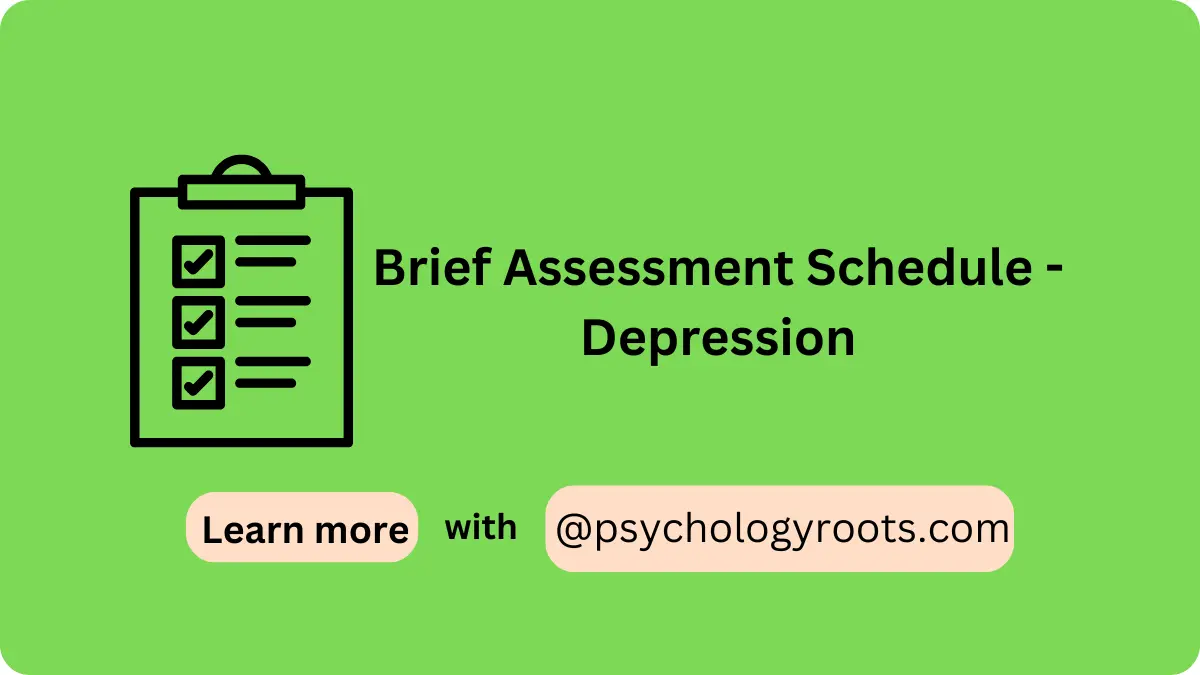Table of Contents
Brief Assessment Schedule – Depression
Here in this post, we are sharing the “Brief Assessment Schedule – Depression”. You can read psychometric and Author information. We have thousands of Scales and questionnaires in our collection (See Scales and Questionnaires). You can demand us any scale and questionnaires related to psychology through our community, and we will provide you with a short time. Keep visiting Psychology Roots.
About Brief Assessment Schedule – Depression
Scale Name
Brief Assessment Schedule – Depression
Author Details
A.J.D. MacDonald and others
Translation Availability
English

Background/Description
The Brief Assessment Schedule – Depression (BAS-D), developed by A.J.D. MacDonald and colleagues in 1982, is a 21-item semistructured clinician-rated interview designed to screen for depressive symptoms in geriatric medical services, including community and long-term care settings. Derived from the depression subscale of Gurland’s Comprehensive Assessment and Referral Evaluation (CARE) system, it was published in Journal of Psychiatric Research (1982). The BAS-D aims to distinguish depression from dementia, as these often co-occur in older adults. It includes questions or statements supplemented by probes (e.g., “How long has this lasted?”) to assess depressive symptoms over the past month. Scores range from 0–24, with a cutoff of ≥7 indicating depression. An 8-item version, the Even Briefer Assessment Scale for Depression (EBAS-DEP), uses a cutoff of ≥3.
The BAS-D is administered only to individuals who can correctly state their age, birth date, or location to ensure cognitive clarity. It was validated with ~811 elderly adults (mean age ≈ 70–90 years, mixed gender, tested in England, Germany, and Australia), achieving high sensitivity (94%) and specificity (79%) at the ≥7 cutoff. The scale is used in geriatrics, psychiatry, and clinical psychology to screen for depression in older adults. Access requires permission from Journal of Psychiatric Research or the authors.
Administration, Scoring and Interpretation
- Obtain the BAS-D from MacDonald et al. (1982) or Journal of Psychiatric Research, ensuring ethical permissions.
- Explain to participants (older adults 70+ in geriatric medical or long-term care settings) that the interview screens for depressive symptoms, emphasizing confidentiality and voluntary participation.
- Administer the 21-item semistructured interview by a trained clinician in clinical or residential settings, using probes to clarify responses, after confirming cognitive clarity (e.g., correct age or location).
- Estimated completion time is 10–15 minutes.
- Ensure a private, supportive environment; provide mental health or geriatric resources (e.g., counseling services) and adapt for accessibility (e.g., clear language, hearing assistance) if needed.
Reliability and Validity
The BAS-D demonstrates strong psychometric properties (MacDonald et al., 1982). Inter-rater reliability is excellent (intraclass correlations [ICC] = 0.94–0.99, kappa > 0.75 for items, N not specified; ICC = 0.80 for bilingual English-German interviews). Internal consistency is high (Cronbach’s alpha = 0.75–0.93 for BAS-D; 0.80–0.86 for EBAS-DEP, N = 811). Italian studies report kappa agreement of 0.70–0.88. Convergent validity is supported by correlations with depression scales (specific values not detailed but implied by high sensitivity/specificity).
Discriminant validity is evidenced by a sensitivity of 94% and specificity of 79% at a cutoff of ≥7 in community samples, distinguishing depression from dementia. The EBAS-DEP retains comparable validity (higher ROC curve area than BAS-D). Factor structure is not detailed, but the scale’s focus on depressive symptoms supports construct validity. Pairing with the Geriatric Depression Scale or CARE dementia scale enhances comprehensive assessment.
Available Versions
21-Items
Reference
MacDonald, A. J. D., Mann, A. H., Jenkins, R., Richard, L., Godlove, C., & Rodwell, G. (1982). An attempt to determine the impact of four types of care upon the elderly in London by the study of matched groups. Psychological Medicine, 12(1), 193-200.
Important Link
Scale File:
Frequently Asked Questions
What does the BAS-D measure?
It screens for depressive symptoms in older adults, distinguishing from dementia.
Who is the target population?
Older adults (70+) in geriatric medical or long-term care settings.
How long does it take to administer?
Approximately 10–15 minutes.
Can it inform interventions?
Yes, it identifies depression for targeted geriatric interventions.
Disclaimer
Please note that Psychology Roots does not have the right to grant permission for the use of any psychological scales or assessments listed on its website. To use any scale or assessment, you must obtain permission directly from the author or translator of the tool. Psychology Roots provides information about various tools and their administration procedures, but it is your responsibility to obtain proper permissions before using any scale or assessment. If you need further information about an author’s contact details, please submit a query to the Psychology Roots team.
Help Us Improve This Article
Have you discovered an inaccuracy? We put out great effort to give accurate and scientifically trustworthy information to our readers. Please notify us if you discover any typographical or grammatical errors.
Make a comment. We acknowledge and appreciate your efforts.
Share With Us
If you have any scale or any material related to psychology kindly share it with us at psychologyroots@gmail.com. We help others on behalf of you.